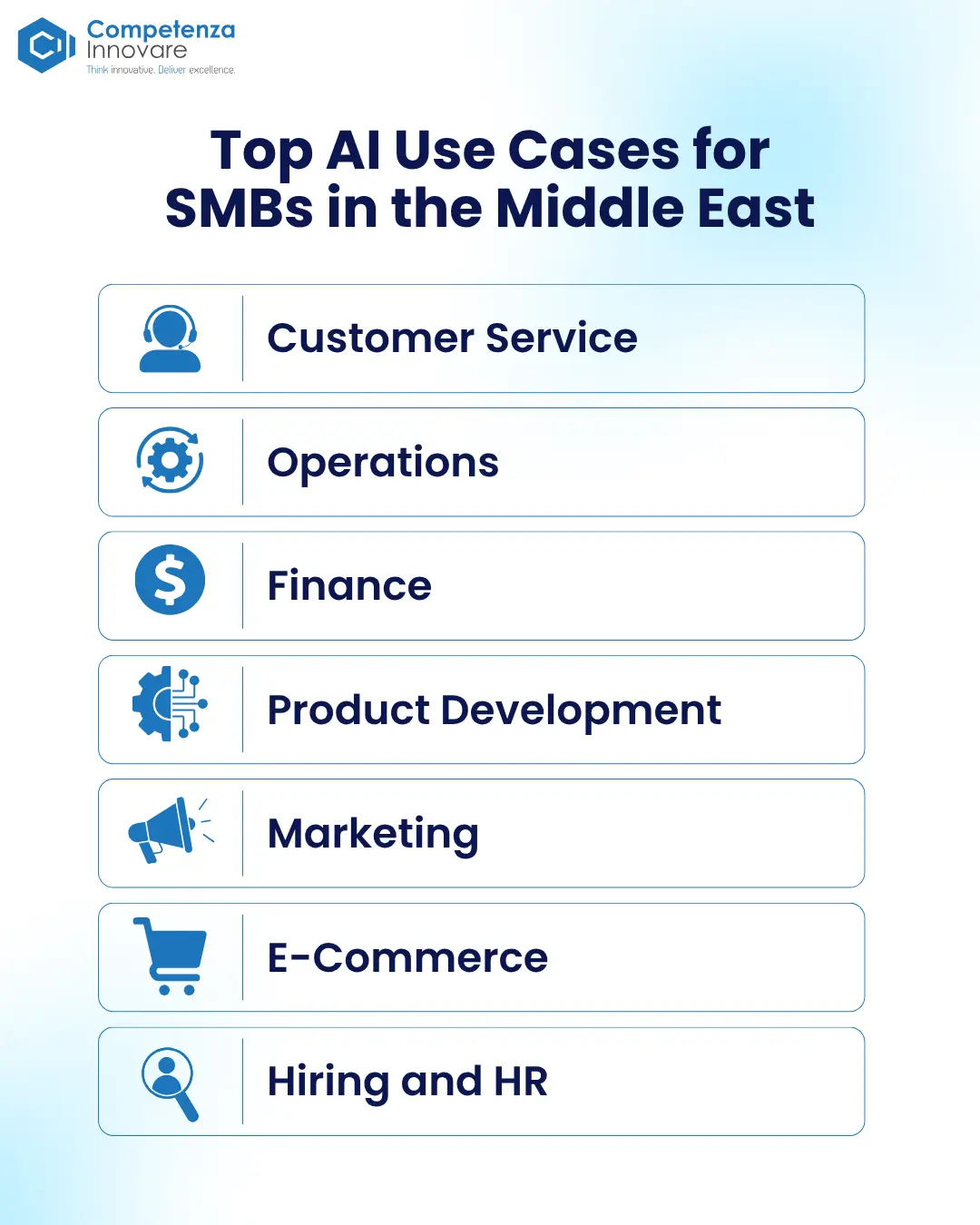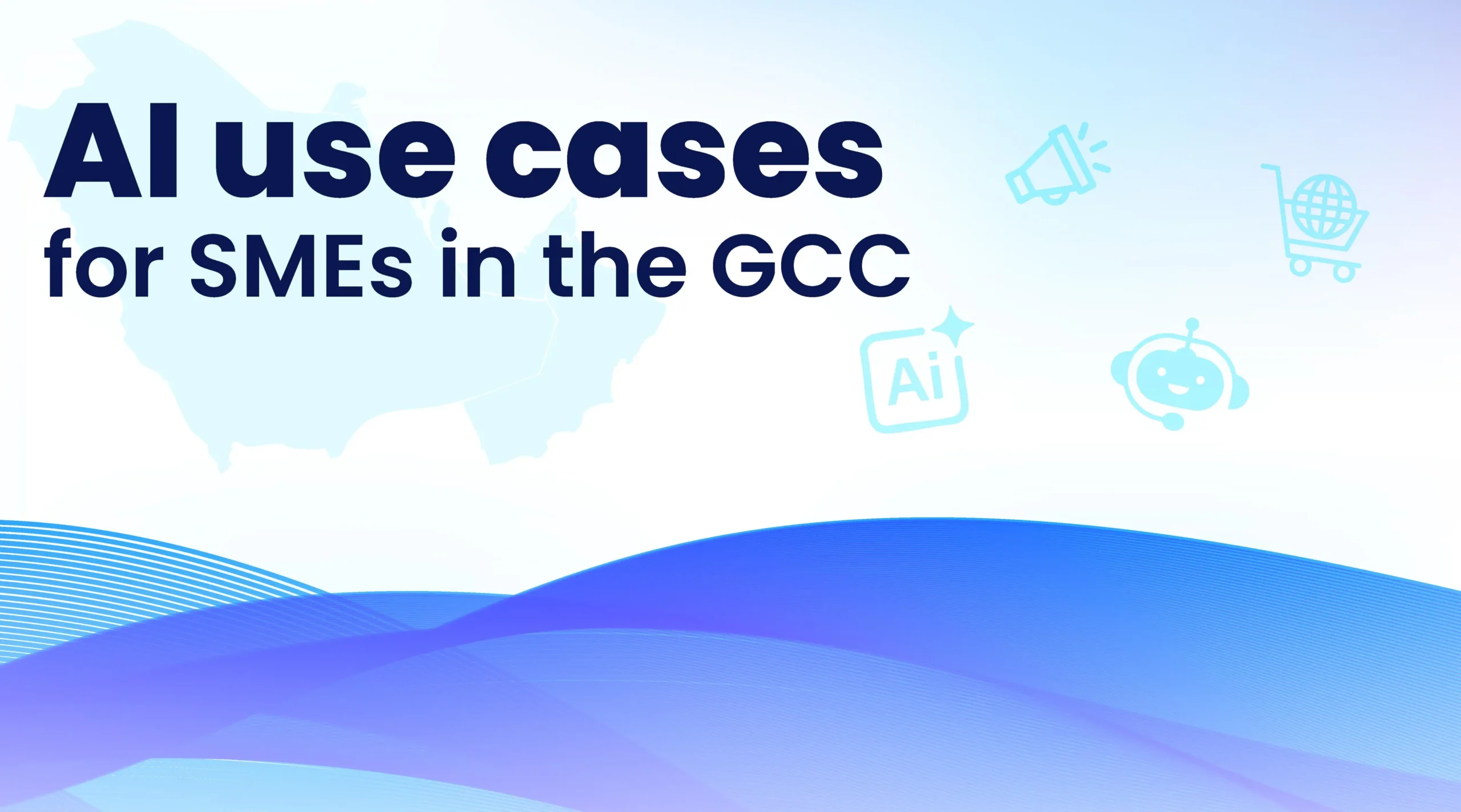Contents
- 1 At a Glance: AI Use Cases for Small Businesses in the GCC
- 2 Introduction: How AI Is Useful for SMBs in the GCC?
- 3 Top 7 AI Use Cases Every GCC SMBs Should Consider
- 4 Common challenges in AI adoption for SMBs
- 5 Pro AI Tools and platforms SMBs can use without heavy investment
- 6 How Competenza can help SMBs launch AI solutions
- 7 Conclusion
- 8 FAQs
At a Glance: AI Use Cases for Small Businesses in the GCC
- AI adoption is growing rapidly among SMBs in the GCC, moving beyond large enterprises and becoming a practical tool for efficiency and growth.
- Government-led initiatives, such as Saudi Arabia’s National Strategy for Data & AI and the UAE’s AI Strategy 2031, are actively encouraging innovation and investment in AI.
- According to PwC, AI is expected to contribute up to USD 320 billion to the Middle East’s economy by 2030, with the UAE and Saudi Arabia leading the charge.
- Small businesses across Dubai, Riyadh, and Doha are successfully using AI to automate routine tasks, deliver superior customer experiences, and improve decision-making without requiring extensive technical teams or massive budgets.
- While AI is more accessible than ever, SMBs still face challenges around budget constraints, limited technical expertise, and uncertainty over selecting and implementing the right tools effectively.
Introduction: How AI Is Useful for SMBs in the GCC?
For years, people saw artificial intelligence as a technology for the future, mainly used by large tech companies and multinational corporations. Now, it offers real benefits for businesses of all sizes, especially those with tight budgets and small teams.
Cloud-based platforms, ready-to-use AI models, and affordable automation tools are making it easier for businesses across the GCC to adopt AI. This shift allows small and mid-sized businesses to implement AI solutions without needing a significant upfront investment or specialized technical team.
Real-world examples that demonstrate AI’s practical value for GCC SMEs:
- SMBs like healthcare clinics use scheduling tools, automate appointment booking with AI chatbots, send reminders, etc This reduces administrative burden and improves patient satisfaction.
- Retail startups are implementing AI-based demand forecasting solutions to cut down on forecasting errors.
- Marketing and content teams are using GenAI tools to build campaigns, design visuals, message briefs, plan a content calendar, and more, which cuts content creation time from days to hours.
In this blog, we will look at the most practical AI use cases that small and mid-sized businesses in the GCC are already using, along with real industry examples and insights to help you on your own AI journey.
Top 7 AI Use Cases Every GCC SMBs Should Consider

1. AI in customer service: 24/7 Support Without Additional Staff
Small businesses find it difficult to provide consistent customer support across multiple channels while managing costs and maintaining service quality, especially in multilingual GCC markets.
A. 24/7 multilingual chatbots
Tools like Sobot and Yellow.ai help businesses automate common support tasks such as answering FAQs or confirming bookings in various languages. This improves availability without needing more staff.
B. Lead capture and qualification through chat
AI chatbots on websites and WhatsApp are allowing small e-commerce and service businesses to qualify leads.
Tools like Tidio capture visitor intent, collect contact info, and schedule sales calls, freeing up human agents to focus on closing deals.
C. Arabic-language customer insights
Saudi Arabia based Lucidya, a social tool, enables analysis of customer sentiment in Arabic content, offering cultural and linguistic accuracy that’s essential for regional engagement.
2. AI in Operations: Streamline Workflows and Reduce Manual Tasks
For small and mid-sized businesses in the GCC, day-to-day operations can be time-consuming and need enough resources. AI is helping automate repetitive workflows, optimize resource use, and improve operational visibility, without heavy investment.
a. Inventory automation and restocking alerts
Platforms like Zoho Inventory and Netstock use AI to monitor stock levels, analyze sales patterns, and automatically generate restocking alerts. This helps reduce overstocking and ensures critical items are always available.
b. Workflow automation for admin tasks
AI bots integrated into tools like Kissflow or Microsoft Power Automate can process expense approvals, leave requests, and timesheets to streamline operations and save man-hours.
C. Route optimization for deliveries and field teams
Logistics-driven businesses use AI-powered tools like Routific and Locus to dynamically plan delivery routes based on real-time traffic and delivery windows, which results in reduced fuel consumption and improved on-time performance.
3. AI in Finance: Automated Financial Management and Fraud Prevention
a. AI-powered fraud detection
Platforms like FICO and SAS use machine learning to detect unusual transaction patterns and flag potential fraud in real time. These solutions are increasingly being adopted by fintechs and SMEs processing online payments across the region.
b. Automated expense classification and audit checks
Tools like Zoho Expense and Xpenditure help businesses auto-classify receipts and categorize spending with a little manual input. AI can also find anomalies or duplicate entries, making audits easier and more reliable.
C. Invoice matching and payment automation
SMBs in the GCC are using tools like Kissflow Finance and AI features in ERPs to automatically match invoices with purchase orders and trigger payment processes. This reduces delays and improves vendor relationships.
4. AI in product development: Data-Driven Innovation and Market Intelligence
AI is helping small and mid-sized businesses in the GCC move faster in planning, designing, and improving products without needing large research or analytics teams. These cases show how SMBs are using AI to reduce risks and deliver what customers want.
a. Customer feedback analysis for smarter product decisions
Tools like MonkeyLearn and Lexalytics scan support tickets, reviews, and surveys to identify recurring issues or feature requests. This helps businesses prioritize product updates based on what users actually care about, turning unstructured feedback into actionable development plans.
b. Improving creativity and design workflows
AI tools can suggest new product features by prompting it with known customer preferences and refining the most promising ideas via additional prompts.
GenAI tools like Midjourney and DALL·E help product and marketing teams in generating visual concepts, UI mockups, or prototypes. These tools speed up creative processes and drive innovation in design-focused businesses.
c. Competitive intelligence for strategic positioning
AI tools like Crayon and Similarweb help businesses track competitor pricing, product launches, and marketing strategies in real time. This is particularly helpful for SMBs entering crowded or price-sensitive markets, giving them the ability to stand out and respond quickly.
5. AI in Marketing
Marketing is one of the most AI-ready areas for SMBs in the GCC, especially those operating online or in multi-channel settings. AI helps automate content, personalize campaigns, and improve performance without needing to increase marketing staff.
A. automated content creation for campaigns
AI tools like Jasper, Copy.ai, and Canva Magic Write enable teams to generate high-quality ad copy, blog content, and social media posts quickly. This reduces creative bottlenecks and shortens go-to-market time.
b. Predictive audience segmentation
Platforms like HubSpot and Attio use AI to segment audiences based on behavior, purchase history, and engagement scores—so businesses can target the right customers with the right message at the right time.
c. Campaign performance optimization
AI-driven platforms such as Adzooma or Smartly.io adjust bids, creatives, and delivery times based on real-time results. This helps SMBs run more cost-effective digital campaigns with better ROI.
6. AI in ecommerce: Personalized Shopping and Intelligent Inventory Management
a. Smart inventory forecasting
AI tools like Netstock and Zoho Inventory analyze past month sales, seasonal patterns, and market trends to predict future demand. This helps prevent overstocking or stock shortages, which are common issues for growing online retailers.
b. Product recommendations and personalization
Platforms like Clerk.io or Segment use AI to deliver real-time product suggestions based on user behavior and preferences. This improves cross-sell and upsell performance and increases average order value.
c. AI-driven product search and navigation
Tools like Algolia and SearchNode improve search features using natural language processing, image recognition, and auto-correction. This makes it easier for customers to find what they need and complete purchases.
7. AI in hiring and HR: Streamlined Hiring and Employee Management
Hiring and HR management often stretch the resources of SMBs, especially in fast-growing sectors across the GCC. AI helps automate routine tasks, improve candidate matching, and reduce payroll errors without needing a large HR team.
a. AI-based resume screening
Tools like Manatal and Zoho Recruit use natural language processing to match resumes with job postings, shortlisting candidates based on skills, experience, and fit. This speeds up screening and improves hiring accuracy.
b. Chatbots for initial candidate interactions
Many businesses based in the GCC use recruitment bots linked with WhatsApp or career sites to handle FAQs, gather applicant data, and set up interviews. This streamlines the early stage of hiring and enhances the candidate experience.
c. Automated payroll and compliance checks
AI-enabled payroll platforms like PaySpace and Deel ensure accurate salary calculations, tax deductions, and regional labor compliance, reducing costly errors and manual oversight.
Common challenges in AI adoption for SMBs
While the benefits of AI are clear, small and mid-sized businesses across the GCC often face roadblocks in AI adoption and implementation like- data accuracy & privacy concerns, limited GenAI expertise, etc that slow or stall adoption. Understanding these challenges is the first step toward building a realistic, results-driven AI strategy.
1. Limited budget and technical expertise
Many SMBs operate with lean teams and limited IT resources. Investing in AI may seem out of reach due to perceived costs or a lack of in-house technical talent. Without dedicated AI professionals, implementation often stalls at the pilot stage.
Specialized training programs, workshops, and certifications can help bridge the AI literacy gap. Partnering with AI startups and tech providers can also enable SMBs to utilize external expertise.
Solution:
Start with low-cost, cloud-based AI tools that require minimal setup. Partner with regional AI consultants for implementation guidance.
Focus on one high-impact use case rather than a comprehensive AI transformation and utilize existing platforms with built-in AI features before investing in custom solutions
2. Lack of clear ROI metrics
Business leaders struggle to quantify the financial return of AI, especially for use cases like customer support or HR. The absence of standardized KPIs makes it difficult to build a business case or justify ongoing investment.
Solution:
- Define specific, measurable objectives before implementation
- Track baseline metrics for comparison post-implementation
- Focus on time savings and cost reduction as primary ROI indicators
- Set realistic expectations for ROI timeline based on use case complexity
3. Overwhelm in tool selection
With hundreds of AI platforms on the market, SMBs are often unsure where to begin. Without guidance, businesses risk investing in solutions that
Solutions:
- Start with business problems rather than AI capabilities
- Evaluate tools based on integration ease with existing systems
- Prioritize platforms with strong customer support and training resources
- Consider regional providers who understand local business requirements
Pro AI Tools and platforms SMBs can use without heavy investment
AI adoption doesn’t have to mean large upfront costs or hiring specialized talent(sometimes it does need hiring people or working with consultants). Many small and mid-sized businesses in the GCC are successfully deploying AI through lightweight, cloud-based platforms that offer fast setup and measurable returns.
1. Plug-and-play AI solutions
Tools like Zoho AI, Microsoft Power Automate, and Salesforce Einstein offer built-in AI features like- lead scoring, email categorization, and workflow automation that require little to no coding. These are ideal for businesses looking to integrate AI into existing systems quickly.
2. Cloud-based analytics platforms
Platforms like Google Cloud AutoML and Amazon SageMaker Studio Lab offer scalable, pay-as-you-go AI models for prediction, classification, and data analysis. These allow businesses to experiment with AI use cases without the need for on-prem infrastructure.
3. GCC-based service providers offering AI bundles
Regional firms like Lucidya (for customer experience), Derq (for smart mobility), and Mozn (for financial fraud prevention) offer tailored, Arabic-language solutions built specifically for Gulf markets. These companies understand local business needs and regulatory frameworks, making them more approachable than global tech vendors.
How Competenza can help SMBs launch AI solutions
At Competenza, we understand that AI adoption is not just about technology—it’s about aligning AI innovation with your business goals. We follow a different approach built for small and mid-sized businesses in the GCC that want real results without complexity or overinvestment.
1. AI consulting and discovery sessions
We start by understanding your business challenges, processes, and goals. Through hands-on workshops, we identify where AI can deliver the highest impact—whether in customer experience, finance, or operations.
2. Data readiness and infrastructure support
AI success depends on clean, usable data. We help you assess your data landscape, set up data pipelines, and prepare your systems for AI implementation—without disrupting ongoing operations.
3. Building lean, purpose-built AI tools
We don’t believe in one-size-fits-all. Our team builds lightweight, scalable AI solutions tailored to your specific workflows—a WhatsApp chatbot, demand forecasting model, or workflow automation bot.
With a deep experience of working with regional organizations like Dubai, Qatar, KSA, Bahrain, and the wider GCC across sectors like retail, healthcare, logistics, and fintech, we bring domain knowledge and technical expertise together.
Ready to start your AI journey?
Connect with us for a free consultation to understand which AI tools and processes can benefit your business and how to implement them right to drive business value.
Conclusion
AI adoption should be driven by clear business needs not technology trends. For SMBs in the GCC, the smartest way to start is by identifying one operational bottleneck or customer-facing pain point, and using AI to solve it.
This could mean deploying a chatbot for lead qualification, automating inventory reordering, or using AI to screen job applications.
The key is to start small, use tools that fit your workflows, and measure impact early. With the right approach, AI won’t just save time, it will sharpen decision-making and unlock new growth opportunities.
Competenza is here to help you move from AI curiosity to confident execution with regional insights, practical tools, and a focus on outcomes that matter.
FAQs
Is AI too expensive for small and mid-sized businesses in the GCC?
No. Today’s AI solutions are designed with affordability and scalability in mind. SMBs can start with cost-effective, cloud-based AI tools—such as chatbots, inventory forecasting systems, or AI-powered CRM features—that offer subscription models and require minimal technical setup. GCC-based businesses are increasingly adopting AI without large IT teams, thanks to regional platforms and plug-and-play integrations.
What are the most practical AI use cases for small businesses in the Middle East?
Some of the most effective use cases include AI in customer service (automated chat and lead capture), AI in operations (inventory and delivery optimization), and AI in finance (expense classification and fraud detection). These are high-impact, low-barrier applications that help businesses improve efficiency and customer experience while managing costs.
How long does it take to see ROI from AI implementation?
Most SMBs see tangible ROI within 1 to 3 months for use cases like customer service automation or marketing personalization. For AI applications in product development or demand forecasting, returns are often realized over one or two business cycles. Key factors include clear KPIs, integration readiness, and the alignment of AI tools with actual business needs.
How can a small business in the GCC get started with AI adoption?
The first step is identifying a repetitive, time-consuming task—such as handling customer queries or managing stock levels—that could benefit from automation. From there, consulting with a regional AI service provider like Competenza can help assess data readiness, evaluate tool options, and design a lean pilot that fits both the budget and operational goals.







